The implementation of the Dayton Accords of 1995 has focused the efforts of policymakers in Bosnia and Herzegovina, as well as the international community, on regional stabilization in the countries-successors of the former Yugoslavia. Relations with its neighbors of Croatia, Montenegro and Serbia have been fairly stable since the signing of the Dayton Agreement in 1995.

The European Environment Agency (EEA) is the agency of the European Union (EU) which provides independent information on the environment.

The European Union (EU) has expanded a number of times throughout its history by way of the accession of new member states to the Union. To join the EU, a state needs to fulfil economic and political conditions called the Copenhagen criteria, which require a stable democratic government that respects the rule of law, and its corresponding freedoms and institutions. According to the Maastricht Treaty, each current member state and the European Parliament must agree to any enlargement. The process of enlargement is sometimes referred to as European integration. This term is also used to refer to the intensification of co-operation between EU member states as national governments allow for the gradual harmonisation of national laws.
The European Union has a number of relationships with nations that are not formally part of the Union. According to the European Union's official site, and a statement by Commissioner Günter Verheugen, the aim is to have a ring of countries, sharing EU's democratic ideals and joining them in further integration without necessarily becoming full member states.
The Phare programme is one of the three pre-accession instruments financed by the European Union to assist the applicant countries of Central and Eastern Europe in their preparations for joining the European Union.

In talks with countries that have expressed a wish to join the European Union, the EU typically concludes Association Agreements in exchange for commitments to political, economic, trade, or human rights reform in that country. In exchange, the country may be offered tariff-free access to some or all EU markets, and financial or technical assistance.
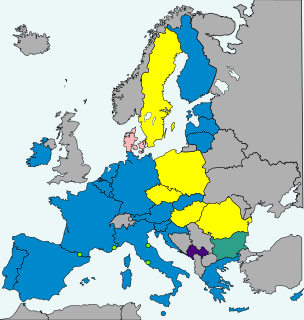
Montenegro is a country in South-Eastern Europe, which is not a member of the European Union, Eurozone nor does it have a formal monetary agreement with the EU, but it is one of the two territories that has unilaterally adopted the euro in 2002 as its de facto domestic currency. This means that the euro is not a legal tender there, however it is treated as such by the government and the population.

Albania is on the current agenda for future enlargement of the European Union (EU). It applied for EU membership on 28 April 2009, and has since June 2014 been an official candidate for accession. Accession talks started in March 2020.
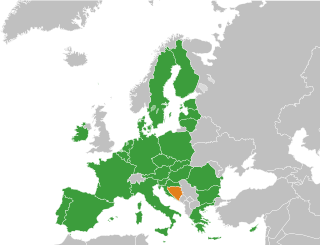
The accession of Bosnia and Herzegovina to the European Union is the stated aim of the present relations between the two entities. Bosnia and Herzegovina has been recognised by the EU as a "potential candidate country" for accession since the decision of the European Council in Thessaloniki in 2003 and is on the current agenda for future enlargement of the EU. Bosnia and Herzegovina takes part in the Stabilisation and Association Process and trade relations are regulated by an Interim Agreement.
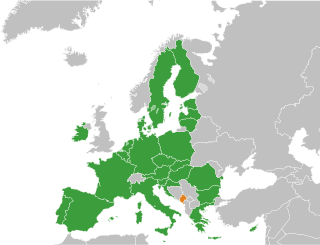
Accession of Montenegro to the European Union (EU) is on the current agenda for future enlargement of the EU.
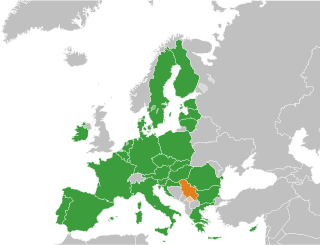
The accession of Serbia to the European Union (EU) has been on the current agenda for the future enlargement of the EU since 2012, when it became a candidate for accession. Serbia officially applied for European Union membership on 22 December 2009. Accession negotiations are currently ongoing. Serbia is expected to complete its negotiations by the end of 2024, allowing it to join the Union by 2026.
The Instrument for Pre-Accession Assistance, or simply IPA, is a funding mechanism of the European Union. As of 2007, it replaced previous programmes such as the PHARE, ISPA, SAPARD and CARDS. Unlike the previous assistance programs, IPA offers funds to both EU candidate countries and potential candidates.
European Union (EU) concepts, acronyms, and jargon are a terminology set that has developed as a form of shorthand, to quickly express a (formal) EU process, an (informal) institutional working practice, or an EU body, function or decision, and which is commonly understood among EU officials or external people who regularly deal with EU institutions.

The Accession of Kosovo to the European Union (EU) is on the current agenda for future enlargement of the EU. Kosovo is recognized by the EU as a potential candidate for accession.

There are five recognised candidates for membership of the European Union: Turkey, North Macedonia, Montenegro, Albania and Serbia. All have started accession negotiations. Kosovo and Bosnia and Herzegovina are recognised as potential candidates for membership by the EU. Bosnia and Herzegovina has formally submitted an application for membership, while Kosovo has a Stabilisation and Association Agreement (SAA) with the EU, which generally precedes the lodging of a membership application. Montenegro and Serbia, the most advanced candidates, are both expected to join no earlier than 2022, with 2025 being more likely. While the others are progressing, Turkish talks are at an effective standstill.

The accession of North Macedonia to the European Union (EU) has been on the current agenda for future enlargement of the EU since 2005, when it became a candidate for accession. Macedonia submitted its membership application in 2004, thirteen years after its independence from Yugoslavia. It is one of five current EU candidate countries, together with Albania, Montenegro, Serbia and Turkey. The use of the country name "Macedonia" was disputed between Greece and Republic of Macedonia between 1991 and 2019. Between 2008 and 2019 there was a Greek veto on the EU and NATO accession talks with that country. After the issue was resolved the EU gave its formal approval to begin accession talks with North Macedonia and Albania in March 2020. However, in November 2020 Bulgaria has effectively blocked the official start of North Macedonia's EU Accession Negotiations over what it perceives as slow progress on the implementation of the 2017 Friendship Treaty between the two countries, state-supported or tolerated hate speech and minority claims towards Bulgaria.
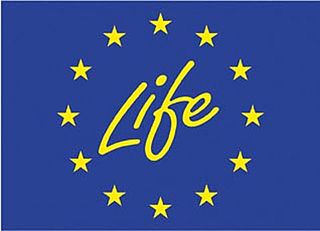
The LIFE Programme is the European Union’s funding instrument for the environment and climate action. The general objective of LIFE is to contribute to the implementation, updating and development of EU environmental and climate policy and legislation by co-financing projects with European added value.

Cross-border cooperation is the collaboration between adjacent areas across borders. In the European Union this is one of the forms of territorial cooperation. The European model is very diverse with cooperation between border regions or municipalities, or through specific cooperation structures. These structures are usually composed by public authorities from different countries organized in working communities, euroregions or EGTCs.

2016 Western Balkans Summit in Paris, France was third annual summit within the Berlin Process initiative for European integration of Western Balkans states. Previous summits took place in Berlin in 2014 and in Vienna in 2015. Heads of government, foreign ministers and the ministers of economy of Albania, Bosnia and Herzegovina, Kosovo, Republic of Macedonia, Montenegro, Serbia, as well as EU member states from the region Croatia, Slovenia and EU member states Austria, France, Germany, Italy as well as representatives of the European Union and the International Financial Institutions took part in Paris summit. Summit took place on 4 July 2016. Participants welcomed the intention of Italy to host the next summit in 2017.

The 2017 Western Balkans Summit in Trieste, Italy was the fourth annual summit within the Berlin Process initiative for European integration of Western Balkans states. Previous summits took place in Berlin in 2014, Vienna in 2015 and in Paris in 2016. Heads of government, foreign ministers and the ministers of economy of Albania, Bosnia and Herzegovina, Kosovo, Republic of Macedonia, Montenegro, Serbia, as well as EU member states from the region Croatia, Slovenia and EU member states Austria, France, Germany, Italy as well as representatives of the European Union and the International Financial Institutions attended. Participants once again committed the Western Balkan's eventual path into the EU and agreed the next Berlin Process Summit would take place in London.